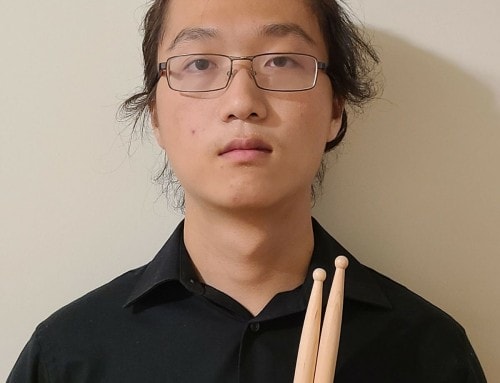B.Mus. (U Lethbridge)
B.Ed. (U Calgary)
M.A. (York U)
Jennifer Wakefield has been a vocal coach and music teacher for over fifteen years. A native of Alberta, Jennifer completed a Bachelor of Music in Vocal Performance at the University of Lethbridge in 1995 and a Bachelor of Education from the University of Calgary in 2003.
During the final term of her B. Ed. Degree, Jennifer relocated to Dar es Salaam, Tanzania for five and a half years, where she held classroom music teaching positions from K-12, conducted an adult community choir, private vocal lessons and participated actively in the local Tanzanian music scene as a soloist. Jennifer’s hands-on exposure to traditional Tanzanian music led her to pursue an MA in Ethnomusicology at York University which she completed in June 2012.
Her recent projects include a vocalist for a Fujiwara piece in the Danceworks 40th Anniversary event, backup vocals for singer-songwriter Melanie Peterson, singer in “Have you seen my sister?” a vocal installation featured at Toronto Nuit Blanche 2017, soprano in “The Christmas Story” pageant a cappella quartet, and arranger/ vocalist and flautist in a Sprig of Rosemary, a Celtic music duo.
Get to know Jennifer…beyond the BIO!
Hobbies: cycling, hiking, choir
Musical influences: Beethoven, Loreena McKennitt, Blackmore’s Night, Karine Polwart
Favourite food: chocolate, cheese
Least favourite food: not enough chocolate, mushrooms
Favourite music: folk rock
Favourite song: Too many to narrow it down! / Both Sides Now (1969) – Joni Mitchell
Favourite movie: Life is Beautiful
Favouirite movie music: Star Wars / Dirty Dancing
Favourite musical theatre/opera: La Boheme – Puccini, Rent
Best quote from your teacher: “Ya gotta love it!”, “Success is 10% talent and 90% hard work.”
Favourite quote: “Life is short, eat dessert first.”, “Yesterday is history. Tomorrow is a mystery. Today is a gift. That is why it is called the present.”
Favourite book: The Alchemist – Paulo Coelho
Best thing about teaching at ABC: Meeting great students and making great music!
Latest Homework from Jennifer
Is Jennifer Your Teacher?
Sign up now to get your weekly assignments delivered, and never lose your homework sheet again!
Homework for the week of Feb. 24 – Mar. 1
Hi all,
Keep up the hard work and beautiful music making. “Without music, life would be a mistake.” (Nietzsche)
Student 1: Vlada
Recommended minutes to practice: 15 minutes per day
What to practice: Vocal warmups for 5 minutes (you tube), 10 minutes on Scarborough Fair
How to practice it most effectively: Sing the parts that are the most challenging. It may be helpful to drop the lyrics and sing on a vowel eg. oo, ee, ah
How parents can support practice: Schedule a regular time every day and a specific place where there are few distractions.
Student 1: Alex
Recommended minutes to practice: 15 minutes per day
What to practice: Vocal warmups for 5 minutes (you tube), 10 minutes on Scarborough Fair
How to practice it most effectively: Sing the parts that are the most challenging. It may be helpful to drop the lyrics and sing on a vowel eg. oo, ee, ah
How parents can support practice: Schedule a regular time every day and a specific place where there are few distractions.
Student 3: Caedan
Great job memorizing Ode to Joy!
Recommended minutes to practice: 15 minutes per day
What to practice: Pg. 37 and onwards
How to practice it most effectively: Double check your starting note, be careful that your thumb does not hang below the keyboard. Be thinking about the note names and naming them outloud sometimes.
How parents can support practice: Schedule a regular time every day and a specific place where there are few distractions.
Student 4: Naiara
Recommended minutes to practice: 30 minutes per day
What to practice: 10 minutes on technique: D major scale, other exercises, 20 minutes on pieces: J.S. Bach Musette (find this song in the google link below) and Faded
https://drive.google.com/file/d/1kQagAOpbmlgtu8V15yY57jbHQO0McuPB/view?usp=sharing
How to practice it most effectively: Play it through first slowly hands separately, then work on the parts that are more difficult.
How parents can support practice: Schedule a regular time every day and a specific place where there are few distractions.
Student 5: Linda
Recommended minutes to practice: 3o minutes per day, plus 15 minutes for Note Speller
What to practice: Scales: A minor + Dminor harmonic, chromatic scale, triads: C major broken and solid
Repertoire: Starry Night- pedal, Ecossaise and Etude- use metronome to help slowly increase the tempo.
How to practice it most effectively: Practice sections at a time and keep adding as the week goes on, memorizing helps with speed.
Homework for week of Feb. 17-22
Hi all,
Great work everyone! It is a joy to hear your music!
Student 1: Vlada
Recommended minutes to practice: 15 min per day (5 min of vocal warmups and 10 min of songs)
What to practice: Vocal warmups- use this link https://www.youtube.com/watch?v=m-3i2CJQo4I
Song: Scarborough Fair
How to practice it most effectively: Print out the sheet music and sing along to you tube
How parents can support practice: Set aside a scheduled time for practice. Provide a private and quiet place to sing
Student 2: Alex
Recommended minutes to practice: 15 min per day (5 min of vocal warmups and 10 min of songs)
What to practice: Vocal warmups- use this link https://www.youtube.com/watch?v=m-3i2CJQo4I
Song: All through the night
How to practice it most effectively: Print out the sheet music and sing along to you tube
How parents can support practice: Set aside a scheduled time for practice. Provide a private and quiet place to sing
Student 3: Caedan
Recommended minutes to practice: 15-20 min per day
What to practice: Ode to joy- memorize, continue learning in your book from pg. 32
How to practice it most effectively: If you make a mistake, practice the hard part, avoid playing through the whole song until you have practiced one section. Make it as beautiful as possible!
How parents can support practice: Keep an ear for pauses and encourage Caedan to go more slowly so the timing stays intact.
Student 4: Oliver
Recommended minutes to practice: 20 min per day
What to practice: Start with Kites in the sky, pg. 28.
How to practice it most effectively: If you make a mistake, practice the hard part, avoid playing through the whole song until you have practiced one section. Make it as beautiful as possible!
How parents can support practice: Keep an ear for pauses and encourage Oliver to go more slowly so the timing stays intact. Talk about intervals used in the music.
Homework for week of Feb. 3 to Feb. 7
Hello all,
It’s nice to hear you making progress on your instrument! Remember that the more consistent you can be with your effort, the easier it is to get where you want to!
Student 1: Caedan
Keep up the enthusiasm!
Recommended minutes to practice: 10 minutes per day
What to practice: start with Old Macdonald, keep doing 2 pages a day, go back and review what you already learned, try one with a metronome at the speed that is playable
How to practice it most effectively: take your time to play, watch for different types of notes (quarter, half, whole notes)
How parents can support practice: Keep an eye on hand shape (like he is holding a ball), and check that he is using the correct fingers
Student 2: Oliver- You played Lonely Pine nicely. Well done.
Recommended minutes to practice: 15 minutes per day
What to practice: Lil Liza Jane, blues chords and scale -see link
https://drive.google.com/file/d/17z4Cu2QOV9TRcBACwjLN_UcGm-33Gbyl/view?usp=sharing
How to practice it most effectively: Take your time to find the correct hand position and starting notes, add your musicality (louds, softs, and feeling)
How parents can support practice: Schedule consistent practice time, listen to great pianists/ instrumentalists.
Student 3: Linda
Your playing is so musical! Keep it up!
Recommended minutes to practice: 30 min per day
What to practice: Scales- keep working on all that you have learned so far- C maj, A min (natural and harmonic), F maj, D min(natural and harmonic) , chromatic scale, Hanon book, theory unit 6
Repertoire: Etude in C major- good start hands together, use metronome and gradually increase the speed
Starry Night- keep working on pedal, right hand melody a little stronger than left, try to memorize a section at a time
Homework for Jan. 27-Feb. 1
Hello everyone!
Keep up the good effort! If you were not able to practice as much as you wanted to, let that go and focus on what you can do this week. Here’s a little riddle for you:
“What has keys but can’t listen to the beauty it unlocks? A piano!”
Student 1: Caedan
Thanks for getting prepared and buying your new book this week. You did a great job of remembering all the animals names for the keys! Plan to set aside the same time every day to play the piano. (if possible)
Recommended minutes to practice: 10 minutes per day
What to practice: pg. 14-16 in Piano Adventures
How to practice it most effectively: Take your time and use the fingers they are asking you to. Say the fingers out loud.
How parents can support practice: Double check that the correct fingers are being used- the more we use all the fingers the faster they will strengthen. Encourage free piano playing without the book buy creating songs with numbers played hands separately.
Student 2: Oliver
You have so much knowledge of music and strong skills already. I encourage you to set aside the same time every day to practice. (if possible)
Recommended minutes to practice: 15 minutes per day
What to practice: pg. 20 and 21
How to practice it most effectively: Take your time and play the songs with as much feeling as you can- remember your louds and softs! Try using a metronome or drum beat to play with.
How parents can support practice: Double check fingering and timing. In order to keep motivation up for practice- consider a reward system- https://takelessons.com/blog/reward-system-for-kids-z15
or use a piano playing app? Choose a pop song that they love and try to play it on the piano.
Student 3: Linda- Remember how far you have come in just over a year !!
Recommended minutes to practice: 30 minutes per day
What to practice: Sight-reading exercises
Scales-A minor and D minor harmonic – use metronome bpm- 69 per quarter note- play it with eighth notes.
Start the chromatic scale- ttps://lessonsinyourhome.net/blog/how-to-play-chromatic-scales-on-the-piano/
Etude in C major- Good start! Try hands together- keep it slow.
Starry Night- It’s sounding beautiful- try the pedal, bring out the right hand, include the dynamics (louds and softs). Practice one phrase at a time. Even start at the end and work your way back to the beginning. Enjoy!
Homework for the week of Jan. 17- 23
Hello all!
Good work everyone. There is some fine playing going on in our lessons!
Student 1: Caedan
Nice to meet you! It will be great to work with you!
Recommended minutes to practice: 10 minutes per day
What to practice: Try a few of the songs on this website
https://takelessons.com/blog/easy-piano-songs-for-kids
How to practice it most effectively: Use all your fingers. Sing the songs as you play
Buy the Primer level – lesson book- Piano Adventures by Faber
Student 2: Oliver
Recommended minutes to practice: 20-30 minutes per day
What to practice: Young Hunter and Lil Liza Jane
How to practice it most effectively: Take time to check that your hands are in the right place and your first finger is on the right note. Look at the dynamics: f, p, mf and play the songs as musically as you can!
Buy the Mark Sarnecki Theory book
Student: Linda
Recommended minutes to practice: 30 minutes per day
What to practice: Scales: F major, A minor harmonic, D minor harmonic
https://study.com/academy/lesson/harmonic-minor-scale-formula-modes-quiz.html
Repertoire: Ecossaise- hands together slowly, Etude in C major- hands separately
Theory unit 5- https://www.masterclass.com/articles/the-basics-of-musical-scales#what-are-half-steps
How to practice it most effectively: Keep going for the laziest fingering! :) Listen to professional pianists for musicality and inspiration.
Homework for the week of Jan. 10-16 2022
Hello!
Good lesson today! Your practice is paying off!
Student 1: Linda
Great job on Menuet. You played it accurately and musically. Well done! Keep up the good technique on your scales.
Recommended minutes to practice: 30 minutes per day
What to practice: Check out the RCM website link for ear training and sightreading
Scale: F major 2 octaves- Keep going with your Hanon, theory unit 5, Starry night and Ecossaise
How to practice it most effectively: Scale- with metronome if needed, same fingering for 2 octaves.
Ecossaise- try alternate fingerings to see if it makes it easier. We will do Starry night next week as well. Listen to performances on you tube.
Preferred Books for Jennifer’s Students
Click to buy them here, and they’ll come right to your house! What could be easier?
Belting - A

Written for ages 5 and 6, My First Piano Adventure captures the child’s playful spirit. Fun-filled songs, rhythm games and technique activities develop beginning keyboard skills.
26 Italian Songs and Arias

This authoritative edition of the world’s most loved songs and arias draws on original manuscripts, historical first editions, and recent research by prominent musicologists to meet a high standard of accuracy and authenticity. Includes fascinating background information about the arias and their composers, as well as a singable rhymed translation, a readable prose translation, and a literal translation of every single word. This title is available in SmartMusic.
Folk Songs for Solo Singers

Selected for contests and adjudications around the country, this incredible volume includes 11 favorite folk songs expertly crafted for solo voice and piano. Arranged by Alfred Music’s finest writers, such as Philip Kern, Jay Althouse, Don Besig, Ruth Elaine Schram, and Carl Strommen.
Easy Songs for the Beginning Soprano

This series was designed to supplement traditional vocal instruction and works perfectly as preparatory literature for The First Book of Solos and The First Book of Solos Part II . Each piece is in English and has a limited vocal range as well as a piano accompaniment that is playable by a student pianist. The pieces include art songs, folksongs, humorous songs, and suitable vintage popular songs and are all appropriate for contest solos. The audio tracks include professionally-recorded accompaniments.






